Quick Summary: The top anonymous Bitcoin wallets are Trezor Safe 5, ELLIPAL Titan 2.0, Samourai, Wasabi, Elecrum, Sparrow Wallet, and Ledger Nano X in combination with one of these software wallets.
I’ve been part of the crypto space for a long time, and one thing that always comes up in discussions is privacy. Well, everyone likes the idea of a decentralized currency, but not everyone realizes how transparent the blockchain can be. You should know, transaction you make is recorded forever, and that record is also public.
So, my guide will review the 10 best anonymous crypto wallets based on security, privacy features (like Tor, CoinControl, CoinJoin, etc.), supported coins, no KYC, and usability. I will also explain what an anonymous digital wallet is, how to use it with a step-by-step guide, and some personal tips on how to hide or mask your identity.
Top 10 Best Anonymous Crypto Wallets List (My Picks)
I have tested all these wallets for hidden transactions. Here are my hand-picked 10 most anonymous and privacy-focused crypto wallets…
- Trezor Safe 5: Secure Element wallet + Tor browser and CoinJoin support for private transactions
- ELLIPAL Titan 2.0: Fully air‑gapped cold wallet with a 4‑inch screen
- Ledger Nano X: Mobile‑friendly hardware wallet with Bluetooth and 5,500+ coins
Samourai: Android‑only anonymous crypto wallet built by privacy activists for stealth spending(no longer operational due to the US seizure)- Wasabi: Open‑source desktop wallet that routes everything through Tor and CoinJoin
- Electrum: Lightweight anonymous Bitcoin client with coin control and multisig options
- Sparrow Wallet: Anonymous desktop wallet with advanced transaction editing and built‑in Tor
- SafePal S1: Budget hardware wallet with QR‑code air‑gapped signing
- Keystone 3 Pro: Open‑source cryptocurrency wallet with triple secure chips and fingerprint sensor
- NGRAVE Zero: Premium air‑gapped wallet with biometric key generation and EAL7 security
These are my 2 personal favorites and best anonymous hardware wallets…
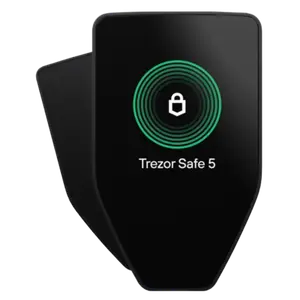
Trezor Safe 5: Tor and Coin Mixing
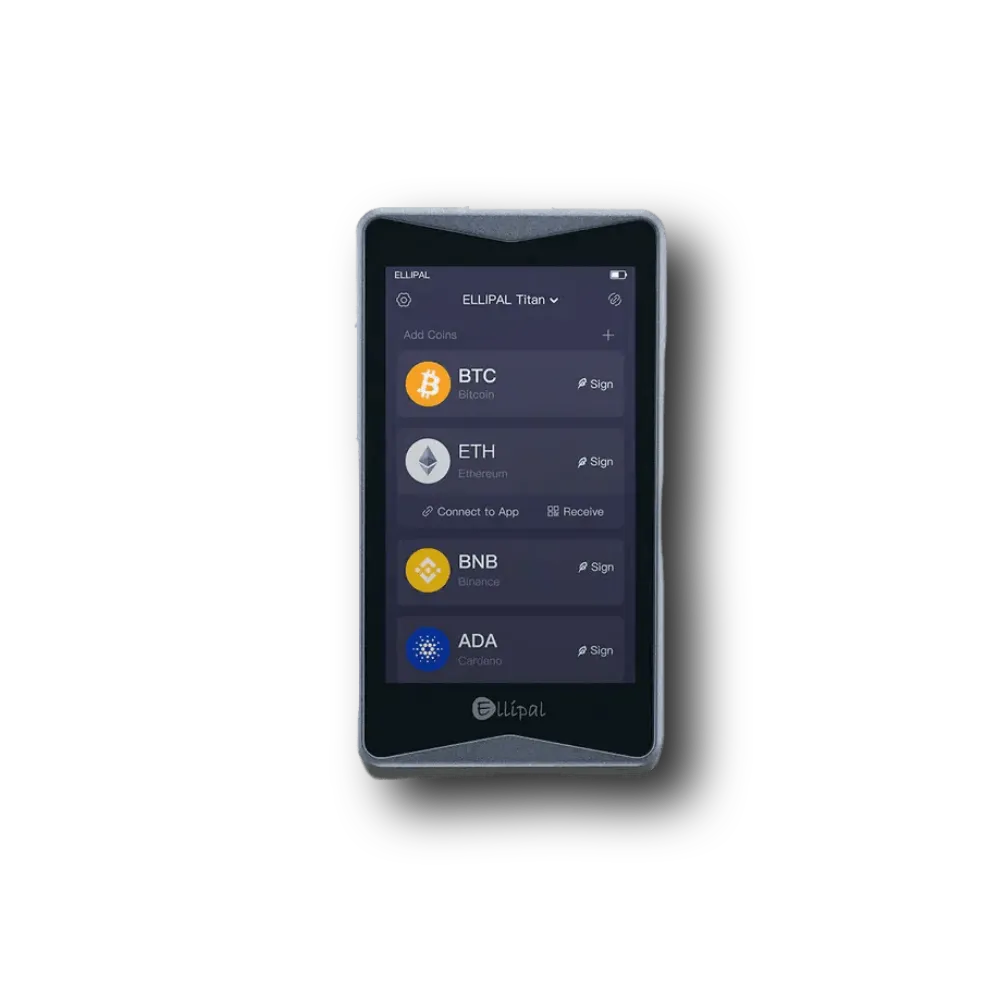
ELLIPAL Titan 2.0
Comparing Best Anonymous Wallets for Private Crypto Storage
First, let me put these best anonymous cryptocurrency wallets head-to-head to compare them. Some are software only, while others are hardware devices with different levels of security and convenience. So, check out your considerations…
| Wallet | Best For | Hidden Wallet | Non‑Custodial | KYC‑Free | Supported Coins | Price |
|---|---|---|---|---|---|---|
| Trezor Safe 5 | Open‑source hardware with Tor and coin control | Yes | Yes | Yes | 9,000+ | USD 169 |
| ELLIPAL Titan 2.0 | Air‑gapped cold storage | Yes | Yes | Yes | 10,000+ | USD 169 |
| Ledger Nano X | Mobile‑friendly | Yes | Yes | Yes | 5,500+ | USD 149 |
| Samourai | Bitcoin privacy on Android with built‑in mixing | No | Yes | Yes | Bitcoin only | Free (software) |
| Wasabi | Desktop CoinJoin mixing | No | Yes | Yes | Bitcoin only | Free (software) + mixing fees |
| Electrum | Bitcoin storage with multisig and Tor options | No | Yes | Yes | Bitcoin only | Free (software) |
| Sparrow | Transaction editing and PSBT support | No | Yes | Yes | Bitcoin only | Free (software) |
| SafePal S1 | Budget air‑gapped hardware | Yes | Yes | Yes | 200+ blockchains and 30,000+ tokens | USD 49–89 |
| Keystone 3 Pro | Open‑source security | Yes | Yes | Yes | ~5,000+ | USD 129–199 |
| NGRAVE Zero | Maximum security with EAL 7 certification | No | Yes | Yes | 2,000+ | USD 398+ |
Best Anonymous Bitcoin and Crypto Wallets Reviewed (only top-rated ones)
In my view, the best anonymous crypto wallet should balance usability, security, and privacy. Also, it strictly needs to keep your private keys off the internet, support the coins you care about, and give you features such as Tor routing, stealth addresses, or transaction mixing to prevent easy tracking.
Well, it also helps if the anonymous wallet is open‑source, and that’s because that allows independent experts to audit the code and makes hidden backdoors less likely. And even cost matters; not everyone has hundreds of dollars to spend on a hardware device.
With that in mind, here are my detailed reviews of the most anonymous wallets for cryptocurrency that support both Bitcoin and Altcoins…
1. Trezor Safe 5: Overall best anonymous crypto wallet for 2026
Trezor has been around since 2013, and the Safe 5 is the latest model in its line of open‑source anonymous hardware wallets. I’ve used earlier Trezor devices for years, and the Safe 5 feels like a top product. It features a vibrant 1.54‑inch color touchscreen with haptic feedback.

In terms of privacy, the Safe 5 integrates with the Tor network in the Trezor Suite software. You can route all your communications through Tor to hide your IP address, and the wallet also supports coin control to help you choose which unspent transaction outputs (UTXOs) you can spend. Coin control is useful when you want to avoid linking inputs and outputs that might reveal your identity.
The device is fully compatible with third‑party software such as Wasabi and Sparrow for CoinJoin or mixing, although Trezor removed native CoinJoin support in 2024. Still, you can pair it with an external wallet that offers mixing.
The Safe 5 houses an EAL 6+ certified Secure Element chip, and its design is open‑source, so anyone can audit the firmware and hardware. The wallet also supports a 20‑word backup standard, along with the traditional 12‑word or 24‑word seed, and you can use a microSD card to create an advanced multi‑share backup.
Best for
- You are a privacy‑conscious user who wants an anonymous, self-custodial, and open‑source hardware wallet
- You who prefer a very user-friendly touchscreen device and tactile confirmation when signing transactions
- You are looking to manage multi-chain coins, including Bitcoin, Ethereum, and ERC‑20 tokens, without providing KYC
2. ELLIPAL Titan 2.0: Best anonymous cold wallet
The ELLIPAL Titan 2.0 impressed me as one of the most anonymous wallets for cold storage on the market. Well, it’s completely air‑gapped, meaning there is no Wi‑Fi, Bluetooth, USB, NFC, or any network connectivity. And instead, the Titan 2.0 signs transactions using QR codes.
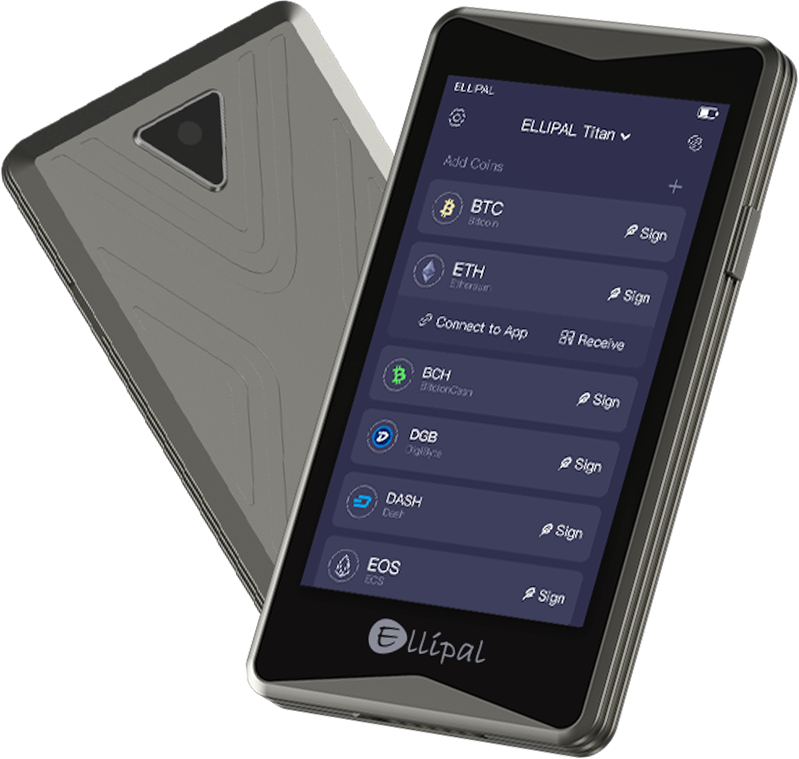
It uses a CC EAL 5+ secure chip, supports gesture PIN and passphrase passwords, and offers a hidden secondary wallet with a separate password for extra safety. And, even if the device detects tampering, it will generally self-destruct by wiping the private keys.
The wallet can manage 5 different seed phrases or private key accounts, and for DeFi and Web3 fans, ELLIPAL also offers integration with 200+ decentralized apps through MetaMask and WalletConnect. Also, you can swap tokens directly from the mobile app without verification.
Best for
- People who want a fully air‑gapped device with no Wi‑Fi, Bluetooth, or USB connections
- Users who value a large touchscreen and a smartphone‑like interface for ease of use
- Those who need wide token support and intend to interact with dApps via WalletConnect
- Travelers or remote workers who want a durable, tamper‑resistant device
3. Ledger Nano X: Best anonymous hardware wallet for Bitcoin
Ledger is another veteran brand in the hardware wallet space, and the Nano X is their flagship mainstream model. Although Ledger caught some criticism in the past about optional key recovery services, the Nano X remains a highly private crypto wallet.
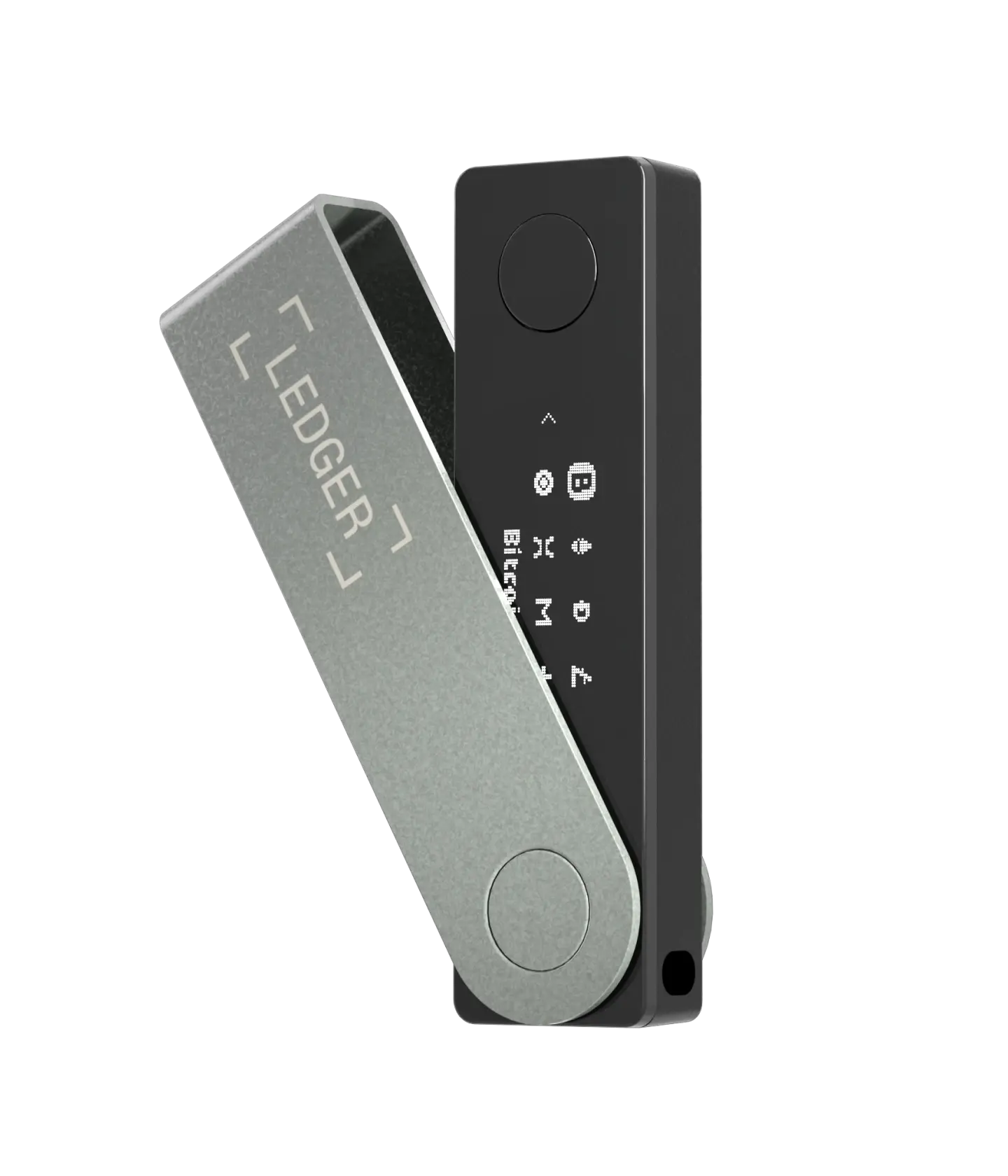
It features a secure chip (CC EAL 5+), Bluetooth connectivity for mobile devices, and support for more than 5,500 coins and tokens. You can store NFTs and even use DeFi services, including crypto staking inside the wallet with full anonymity.
For privacy, Ledger doesn’t require KYC to set up the device, and you can easily generate your own random seed phrase locally, choose a PIN, and store everything offline. Also, Ledger’s firmware, called BOLOS, isolates apps from each other to reduce cross‑app vulnerabilities.
Well, the device itself does not support Tor, but you can route your phone or computer through Tor or a VPN. Ledger also integrates with Monero’s GUI wallet and enables anonymous XMR transactions.
Best for
- Crypto users who want a mobile‑friendly hardware wallet with Bluetooth connectivity
- Those managing diverse portfolios of coins and tokens (5,500+ supported assets)
- People who value integration with Ledger Live for staking, DeFi, and NFTs
4. Samourai: Best anonymous Bitcoin wallet for identity mask
Note: Samourai Wallet’s web servers and domain, including its website, were seized by the U.S. law enforcement in April 2024 as part of a crackdown on cryptocurrency mixers for alleged money laundering and evading sanctions.
Samourai is the most anonymous Bitcoin wallet I have ever seen. It’s available on Android and is free and open‑source. So, when you download Samourai for the first time, you will be impressed by how many privacy tools are integrated into one app.

The wallet automatically creates a new address for every incoming transaction and includes a suite of advanced features: Whirlpool (a CoinJoin implementation), Stonewall and StonewallX2 (transaction obfuscation techniques), Ricochet (adds hops to your payments to confuse chain analysis), and PayNym (stealth addresses based on BIP 47 that hide your identity when you receive funds). There is also a Scrambled PIN entry that randomises the keypad to thwart keyloggers, and Stealth Mode, which hides the app icon on your phone.
The Samourai ecosystem includes Sentinel (a watch‑only app), Dojo (a full Bitcoin node that routes all traffic through your own server), and TxTenna (for offline transactions via the goTenna mesh network). Well, these tools generally allow you to run your own node and broadcast transactions in a way that bypasses internet surveillance. Also, even if your phone is ever lost or stolen, you can send remote SMS commands to wipe or back up your wallet.
Best for
- Bitcoin users who prioritize transaction privacy and want built‑in CoinJoin, stealth addresses, and obfuscation tools
- Individuals who prefer running their own full node via Dojo for maximal sovereignty
- Users who are comfortable with Android phones and willing to learn advanced features such as Whirlpool mixing
5. Wasabi: Privacy-focused Bitcoin wallet for Windows, Mac, & Linux
Wasabi is a desktop‑based Bitcoin anonymous wallet that puts privacy front and center. It’s free, open‑source, and works on Windows, macOS, and Linux. I’ve used Wasabi for several years, and it remains one of the simplest ways to mix your crypto transactions.

Here, all network traffic is routed through the Tor network automatically, so your IP address is hidden from the moment you open the wallet. Wasabi also uses client‑side block filtering, meaning your wallet downloads only block headers and filters relevant to your addresses. Hence, that eventually prevents servers from learning your transaction history.
Now, the top-quality feature of Wasabi is its implementation of WabiSabi. It’s basically an improved CoinJoin protocol that allows multi‑party transactions. So, you can combine multiple inputs from several participants into one large transaction, obfuscating who owns what.
Also, the wallet integrates easily with most of the top hardware wallets, such as Trezor, Ledger, and BitBox. You can pair your device to keep your private keys offline while mixing transactions.
Best for
- Bitcoin holders who want an easy desktop wallet with integrated CoinJoin mixing
- Users who appreciate automatic Tor routing and client‑side block filtering for anonymity
- People who are comfortable using hardware wallets along with software for extra security
6. Electrum: Open-source private wallet for Bitcoin storage
Electrum is one of the oldest Bitcoin wallets, launched back in 2011. It’s a lightweight client rather than a full node, so it starts quickly and doesn’t require you to download the entire blockchain.

Similar to others, the wallet is self-custodial, supports multi‑signature wallets, and allows you to connect to your own server for better privacy. Electrum servers handle most of the heavy lifting, but you can run your own ElectrumX server or connect to a trusted one.
Now, when it comes to privacy, Electrum offers a few important tools. First, it supports coin control and allows you to manually select which inputs to spend, and this prevents unnecessary linking of your addresses.
Second, it integrates with Tor; you can configure Electrum to run over the Tor network to hide your IP address from Electrum servers. Third, because it’s open‑source, the community continuously audits the code for potential vulnerabilities. Plus, Electrum also supports BIP 39 mnemonics, watch‑only wallets, and custom transaction fees.
Best for
- Long‑time Bitcoin enthusiasts who want a lightweight, open‑source wallet with a proven track record
- Users who need multi‑sig capabilities or custom transaction scripting
- People who are comfortable with manually managing UTXOs and connecting over Tor
7. Sparrow Wallet: Desktop wallet for transaction mixing
Sparrow is another best anonymous crypto wallet for Bitcoin desktop users, designed for security, privacy, and usability. Well, it was first created by a single developer but has grown into a well‑respected project.

It supports single‑signature and multi‑signature wallets with all common script types. And it’s mainly built around the Partially Signed Bitcoin Transaction (PSBT) standard and allows you to interact seamlessly with hardware wallets in either USB or air‑gapped mode.
So, you can generally import wallets from Trezor, Ledger, Keystone, Coldcard, and other devices. The wallet also supports PayNym (BIP 47). So, meaning you can share a static payment code without revealing individual addresses. Other top anonymity features: built‑in Tor routing hides your IP address, and the wallet can connect to public servers, your own Bitcoin Core node, or a private Electrum server.
Sparrow now also supports both Stonewall (a fake CoinJoin transaction that increases entropy) and Whirlpool CoinJoin through integration with Samourai’s Dojo.
Best for
- Users who want a feature‑rich desktop wallet with an easy‑to‑understand interface
- People interested in transaction editing, coin selection, and PSBT support
- Bitcoin holders who are mainly looking for a privacy‑oriented wallet that integrates with hardware devices
8. SafePal: Most affordable and budget-friendly wallet for anonymity
SafePal started as a Binance‑backed project, and the S1 hardware wallet targets budget‑conscious users. At roughly $50, it’s one of the most affordable and best anonymous cryptocurrency wallets available that still offers robust privacy. Similar to Titan 2.0, the S1 is completely air‑gapped: there are no USB, Bluetooth, Wi‑Fi, or NFC connections.
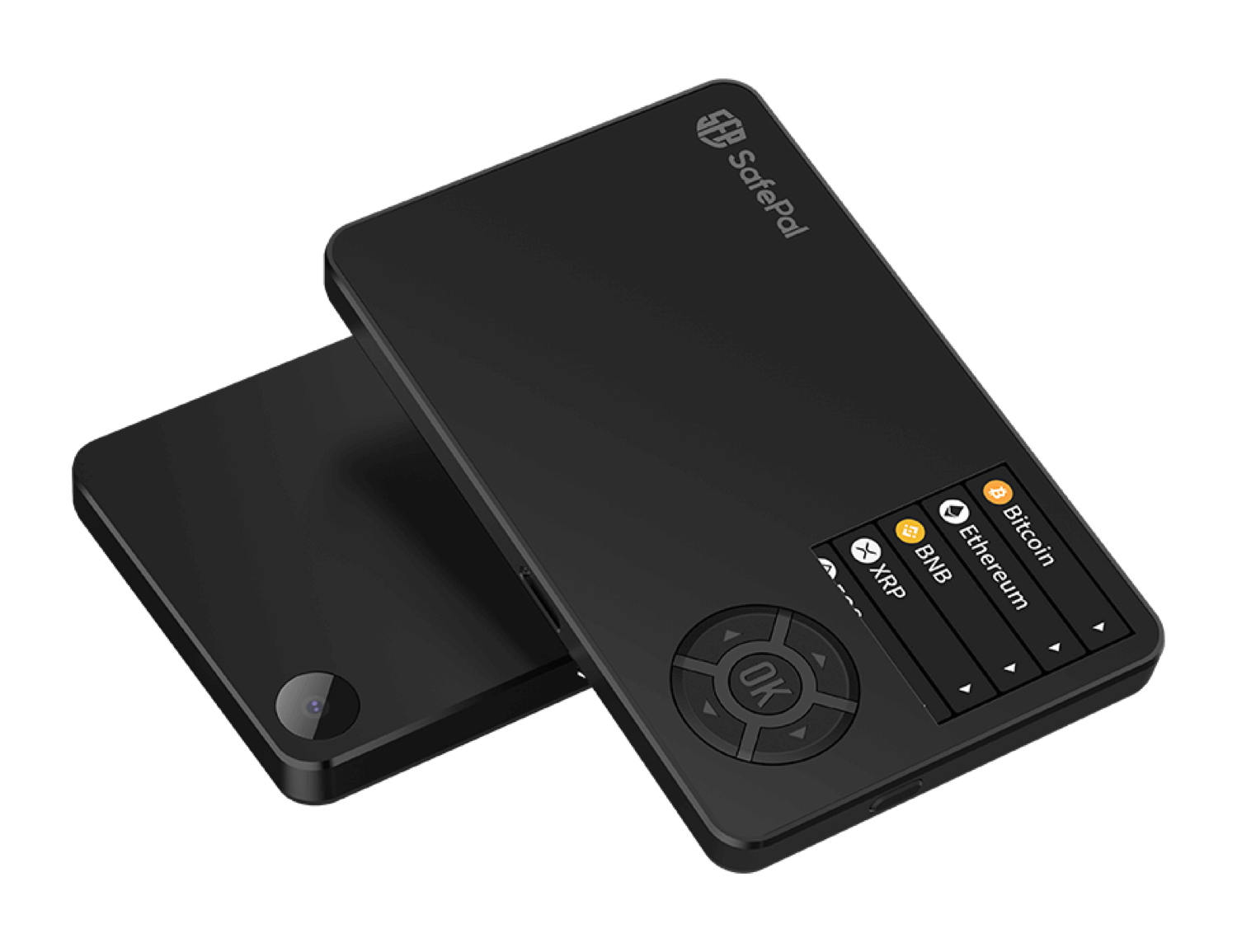
The S1 and S1 Pro use a CC EAL 6+ secure element chip, and include a self‑destruct mechanism that wipes keys after multiple failed attempts, and they are encased in tamper‑resistant material. SafePal supports more than 200 blockchains.
SafePal also launched a Swiss‑licensed banking gateway and lets users convert fiat currencies (USD, EUR, GBP, JPY) to crypto through a compliant bank account. Well, this bank card is optional and does require identity verification, but the wallet itself remains no‑KYC.
Best for
- Price‑sensitive users who still want strong security and air‑gapped signing
- People who hold diverse portfolios across dozens of blockchains and tokens
- Users who want an integrated mobile app that supports staking, dApps, NFTs, and DeFi
Other Offline Private Wallets to Look Into and Consider Using
| Image | Anonymous Wallets | Price |
 |
NGRAVE ZERO |
$399.00
|
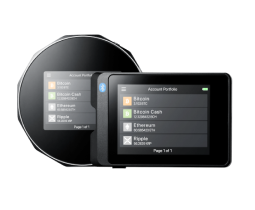 |
SecuX V20 and W20 |
$99.00
|
 |
KeepKey |
$49.00
|
You can also check out my in-depth guide on the best hardware wallets…
What Are Anonymous Crypto Wallets?
Anonymous cwallets are tools that let you create addresses and manage coins without handing over your identity. Mainly, they are non‑custodial, so you hold your own keys, and there’s no signup with names or emails.
Most of these are mobile or desktop apps, while others are hardware devices. And most of the privacy-focused crypto wallets include Tor routing, address rotation, or CoinJoin support to make tracing harder. Well, to be honest, they don’t make you 100% invisible, but they help break the link between your wallet and your real‑world self.
Are anonymous crypto wallets safe and legal?
In most places, owning a self‑custody wallet is actually fine because it’s just a piece of software or hardware. However, some privacy techniques, like mixing, mostly sit in a regulatory gray zone.
Certain jurisdictions have cracked down on mixing services, and new laws may limit privacy tools in the future. But, as long as you follow your local laws and don’t use privacy tech for illegal activities, you should be okay.
Now, on the safety side, hardware crypto wallets with secure chips keep keys offline, and open‑source software like Wasabi is audited by the community. So, yes, these best anonymous crypto wallets are safe, but not 100% legal.
Advantages of using crypto anonymous wallets
The benefits of using anonymous cryptocurrency wallets are high privacy, no spending limits, zero censorship, and less risk of data leaks.
- More Privacy: Anonymous wallets keep your financial activities private, and people can’t easily see what you’re buying or who you’re sending money to by looking up your personal info. So, it’s like using cash instead of a credit card.
- No Limits: You know, many regular crypto exchanges have limits on how much you can send or withdraw in a day or month. Since anonymous crypto wallets aren’t tied to your identity, they don’t even have these kinds of limits.
- No Censorship: In some countries, governments might try to control who can send money to whom. But with a private wallet, you can send money to anyone, anywhere, without needing permission from a bank or government.
- Less Risk of Data Leaks: Since you don’t have to give any personal information, you don’t have to worry about a company getting hacked and your private data being stolen.
Risks of using crypto anonymous wallets
The drawbacks of using crypto wallets with full anonymity are scams and hacks, no customer support, and some legal problems.
- Scams and Hacks: The same anonymity that protects you also makes it easier for scammers to operate. Hence, if you get scammed, it’s almost impossible to find the person or get your money back.
- No User Support: There’s usually no customer service team to help you if you have a problem. So, you have to figure out all the technical stuff yourself.
- Legal Problems: Because they are often used for illegal things, anonymous wallets can draw attention from the government. And, if your wallet is connected to illegal activity, you could get in serious trouble.
Comparing Pseudonymous vs. Truly Anonymous Transactions
| Category | Pseudonymous Transactions (like Bitcoin) | Truly Anonymous Transactions (like Monero) |
| Identity Link | Wallet addresses are public. The real person is hidden unless the address is linked to them. | Both the wallet address and the transaction details are hidden. |
| Visibility | All transactions are public on the blockchain for everyone to see. | Transactions are hidden and can’t be seen by the public. |
| Traceability | Can be traced by special companies that analyze the public data on the blockchain. e.g. ZackXBT | Very hard, almost impossible to trace. |
| Privacy Level | Not truly private, but private enough for many people. | Very private, designed for maximum secrecy. |
My Methodology: How I Pick the Most Anonymous Crypto Wallets
So, to build this list, I basically combined personal testing with community feedback. I gave, like, high marks to wallets that keep keys off the internet and use secure chips.
Next, I also looked for features like Tor routing, coin control, and CoinJoin support. So, here, only non‑custodial wallets that let you generate and control your seed phrases made the cut.
Plus, I even weighed ease of use, reputation, and price so that beginners can also find some suitable options. In the end, I compared my notes and wrote these reviews on the best anonymous crypto wallets from my perspective.
How to Hide Identity In a Wallet When Transferring Cryptocurrency?
Honestly, when I first started exploring crypto privacy, I assumed that having an anonymous crypto wallet was enough. Well, that’s not the only case. I mean, a wallet is just a tool; how you use it basically determines how private you remain.
So, here’s my personal approach and recommendation for hiding your identity when transferring crypto…
Method 1: Use a VPN or Tor for network privacy
You should always connect through a reliable VPN or the Tor network before opening your wallet. You know, this will mask your IP address and location. Tor routes traffic through multiple nodes, making it, like, difficult for anyone to trace the origin.
Method 2: Separate your identities
Basically, I maintain several wallets for different purposes and never mix personal funds with anonymous funds. You should do that too. Anyway, when you need to move coins between wallets, you just have to use intermediate addresses to break the link.
For example, after receiving Bitcoin from an exchange, you can send it to a mixing wallet like Wasabi or Samourai before moving it to long‑term cold storage.
Method 3: Use CoinJoin or mixing services
CoinJoin mainly bundles multiple users’ inputs and outputs in a single transaction and makes it really hard to trace the origin of each output. You should honestly regularly mix coins using Whirlpool in Samourai or WabiSabi in Wasabi.
Well, another option is JoinMarket; it’s a decentralized CoinJoin market. Okay, mixing adds fees and time, but it significantly improves privacy.
Methods 4: Utilize stealth addresses and PayNym codes
Also, when receiving payments, you must avoid sharing the same address twice. Stealth address systems like PayNym generate unique addresses linked to a static code. This way, you can post a PayNym handle publicly without revealing your actual addresses.
Method 5: Avoid linking personal information
Again, you should never reuse addresses for public donations or business payments, and must refrain from associating wallet addresses with your real name on social media. Even posting a transaction hash on a public forum can easily link your identity to a wallet.
Method 6: Cash on/off ramps carefully
Nowadays, buying crypto anonymously is really tricky, and I just prefer using peer‑to‑peer trades, cash ATMs, or voucher services that don’t require ID.
So, when I must use an exchange, I mix the coins before sending them to my anonymous crypto wallet. Similarly, when cashing out, you must move funds through mixing before depositing them into your bank. Hence, nobody will ever know how many Bitcoins you hold.
How to Set Up and Use a Crypto Wallet Anonymously?
To set up and use anonymous crypto wallets like Wasabi, you need to download the app, create a secure wallet with recovery words, receive Bitcoin, let CoinJoin mix your coins, and then send them privately.
Step 1: Download and Install
First part is, you should head over to Wasabi’s official site and download the wallet for your operating system: Windows, macOS, or Linux. Now, once you have downloaded it, install it like any other app.
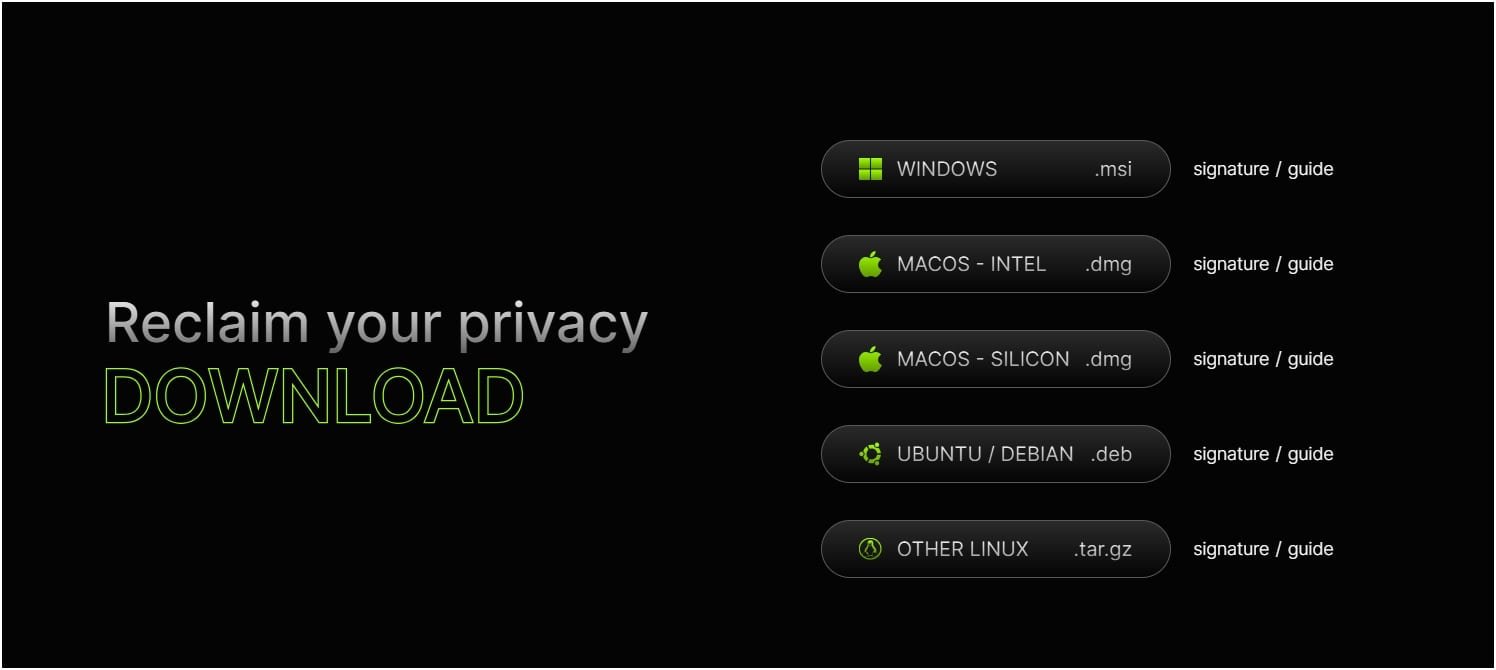
Step 2: Create Your Wallet
Launch the app and click “Create New Wallet.”
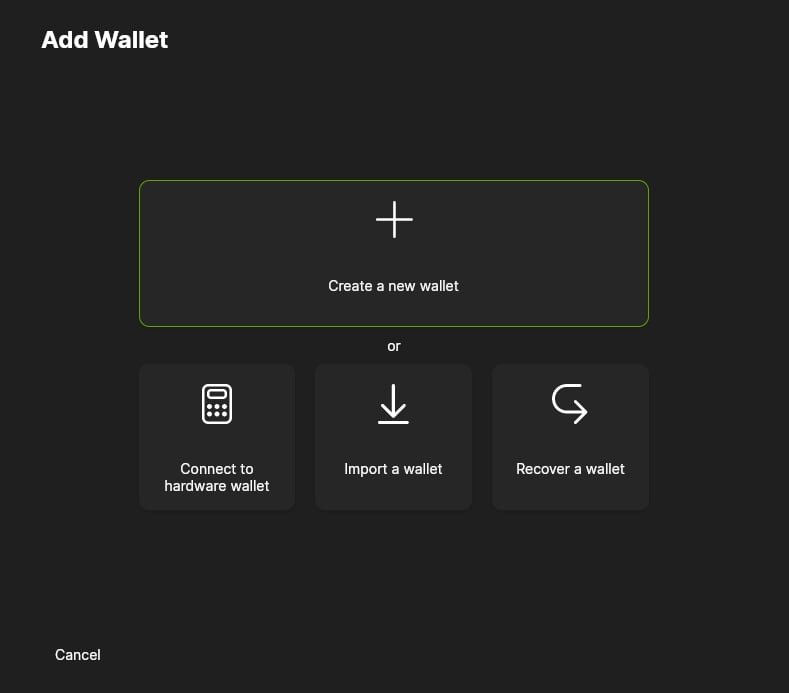
You’ll be asked to:
- Name your wallet
- Write down your 12 recovery words (store them offline!)
- Set a passphrase (this acts like a 13th word, don’t lose it)
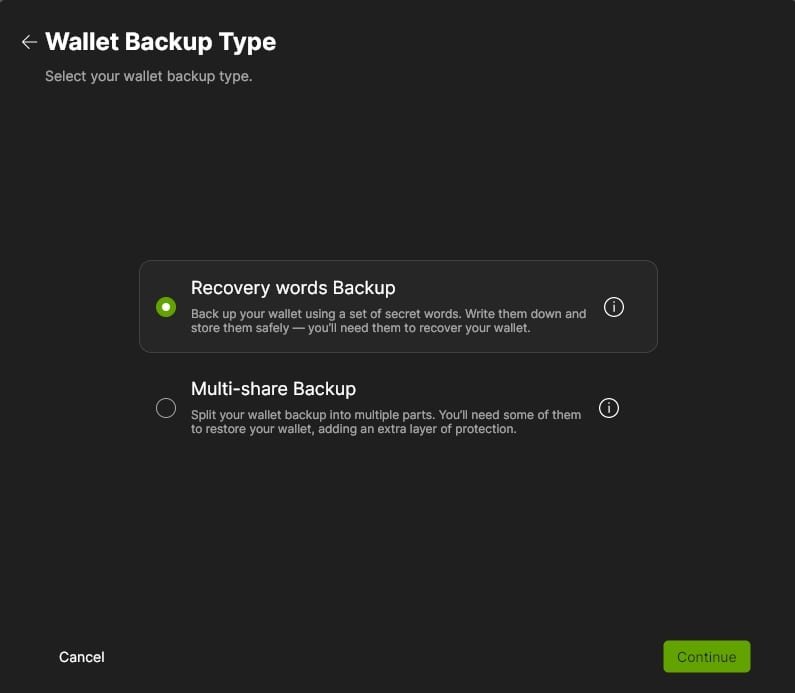
Step 3: Receive Bitcoin
Click “Receive” at the top right, and you’ll get a fresh address: send some of your Bitcoin here. Now, once it lands, Wasabi will automatically start the CoinJoin process if the amount is above the threshold (this is usually around 0.01 BTC or more).
Step 4: Let CoinJoin Do Its Thing
CoinJoin mixes your coins with others in a pool, breaking the link between your identity and your funds. You don’t need to do anything. Wasabi handles it in the background. You’ll see a privacy score improve as mixing progresses.
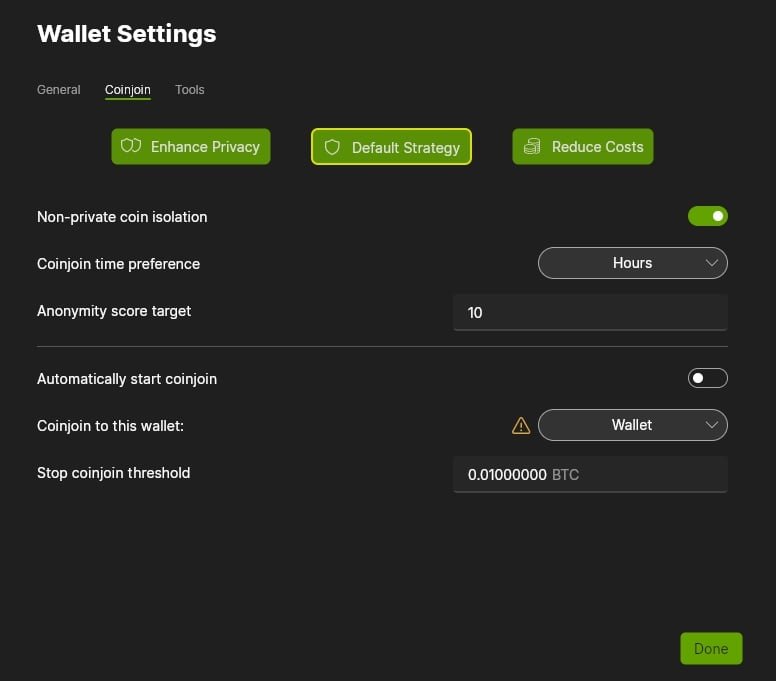
Step 5: Send Bitcoin Privately
Next, go to “Send” and choose your destination, and make sure to only use mixed coins for maximum privacy. Also, remember to avoid combining mixed and unmixed coins in one transaction, because it weakens anonymity.
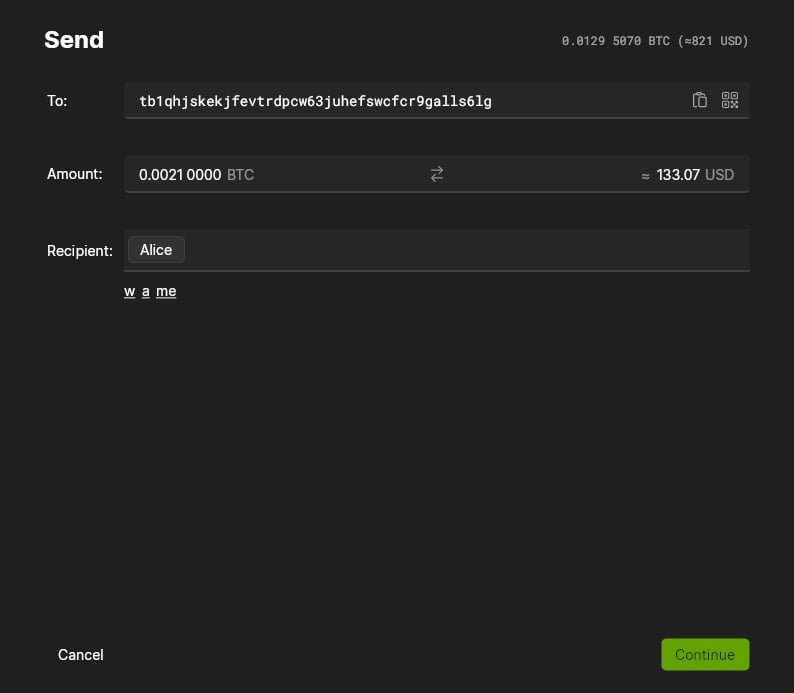
My Tips: How to send crypto anonymously?
To send crypto anonymously, my usual process goes like this: I mix coins through a service like Whirlpool to break any link to the source, and then withdraw the mixed coins to a new address and connect to the network through Tor or a VPN.
Next, when sending, I mainly enable obfuscation features if available and break large payments into smaller chunks to make analysis harder. Finally, I verify all details on the hardware screen and monitor the transaction through a block explorer. Here, obviously, each extra step costs a bit more in fees but adds another layer of privacy.
What is the best crypto wallet without ID verification?
The Trezor Safe 5 offers the best mix of security, ease of use, and price without ID verification. To start with, it’s fully open‑source, supports thousands of assets, and you can route traffic through Tor.
Now, budget crypto HODLers might look at SafePal S1 or ELLIPAL Titan Mini. And, if you only transact in Bitcoin and want extreme privacy, Samourai or Wasabi are excellent choices.
What are the best privacy coins to invest in?
Monero (XMR) remains the gold standard in privacy coins, with ring signatures and stealth addresses by default. Another one, Zcash (ZEC), also offers optional shielded transactions using zero‑knowledge proofs.
Also, Dash crypto provides PrivateSend mixing, Firo (FIRO) uses the Lelantus protocol, and Verge (XVG) routes transactions over Tor and I2P. So, all of these coins enhance on‑chain privacy, but laws vary by country, and most of these are not allowed in the U.S.
You can also read my other guides on wallets, like the best cold wallets and the best multi-chain hardware wallets.
Disclaimer: Let me be clear: there is no such thing as perfect anonymity on a public blockchain. Even the best tools can only make it harder to track you; they cannot erase all traces of your activity. Also, this isn’t legal advice; the laws in your country may restrict some of the privacy techniques I describe. My aim here is to only inform you so you can make your own decisions and stay private while using your favorite digital assets.
